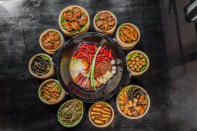This weekend, if you wade into the ocean near Santa Monica or Venice, you may feel something odd lapping around your ankles. Not seaweed or jellyfish. More likely it's soggy bread.
About this story
This story originally ran in 2018. Tradition being tradition, there wasn't much to update! Enjoy.
Say what? Did the sewage pipes overflow? Is this a new form of fish bait?
In fact, what you'd be seeing is sin. Not the sin of wasting bread (more on that later) but an ancient tradition, known as tashlich, that some Jews practice on Rosh Hashanah, the New Year: discarding their symbolic sins — which might include lying, repeating juicy gossip or not giving enough to charity — into moving water.
For most urban Jews, this means throwing breadcrumbs into a nearby river or stream. But in Southern California, the ocean's available, and hey, it's more fun to be on the beach. So along the coast, you'll see groups of adults and children, barefoot but dressed in the same clothes they wore to synagogue, loping over the sand holding a plastic bag full of bread.

About the ritual
Each community stakes out a different part of the beach, but the ritual is the same — a few words from the rabbi, maybe a blessing, and then the throwing of the bread.
There is one drawback being at the beach. Backwash.
Waves have a funny habit of returning to land so after a while, when there's a whole bunch of people casting away their sins, you feel pieces of warm, waterlogged bread slapping your legs. It's kind of like wading into a soup of dinner rolls. Then there's the existential humor of seeing your sins come back. Didn't I just discard you? Humanity couldn't have dreamed up a more on-the-nose visual metaphor about repeating our mistakes.

The synagogue I go to, Mishkon in Venice (you can see the ocean from its top step, a perk of attendance), in an attempt to be eco-friendly, has asked its members to throw pieces of seaweed instead of bread. Soggy bread, even if it's organic wholegrain, isn't good for the birds or wildlife although the ecstatic reaction of the seagulls suggests they have no problem with the practice.
Calculating the sin quotient
Over the years, I've found my sin quotient has roughly been the size of one crust of white bread, torn into many pieces. Last year, I tried tossing small pieces of seaweed but it didn't have the same heft in my hand. The seaweed seemed too lightweight for 12 whole months of coveting my friend's new shoes and not phoning my ailing uncle enough, let alone gluttony and impatience. I'd need an entire pile of the squelchy stuff for that.

I still have some time to decide what to do. Rosh Hashanah begins at sundown this Friday night, Sept. 15, but our community is going to do Tashlich on Sunday, Sept. 17, at 5 p.m. (by lifeguard station 28 in Santa Monica, if you're interested).
So if you do go down to the beach and spot people with their pants rolled up, squinting and sweating in the sun with fistfuls of bread (or seaweed), you can give them a knowing smile, say "L'shana tova" (that's Hebrew for Happy New Year) and look for the screaming gulls dive-bombing each other to get to their glutinous, gluttonous once-a-year treat.












